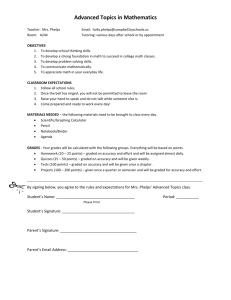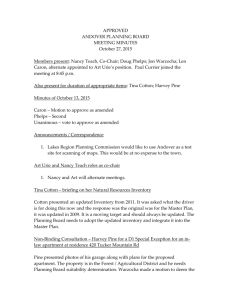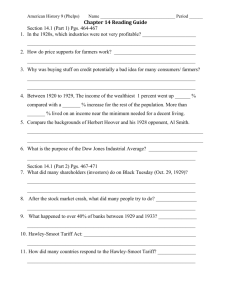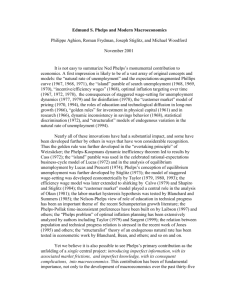Sample Summer Reading 1 Paper
advertisement
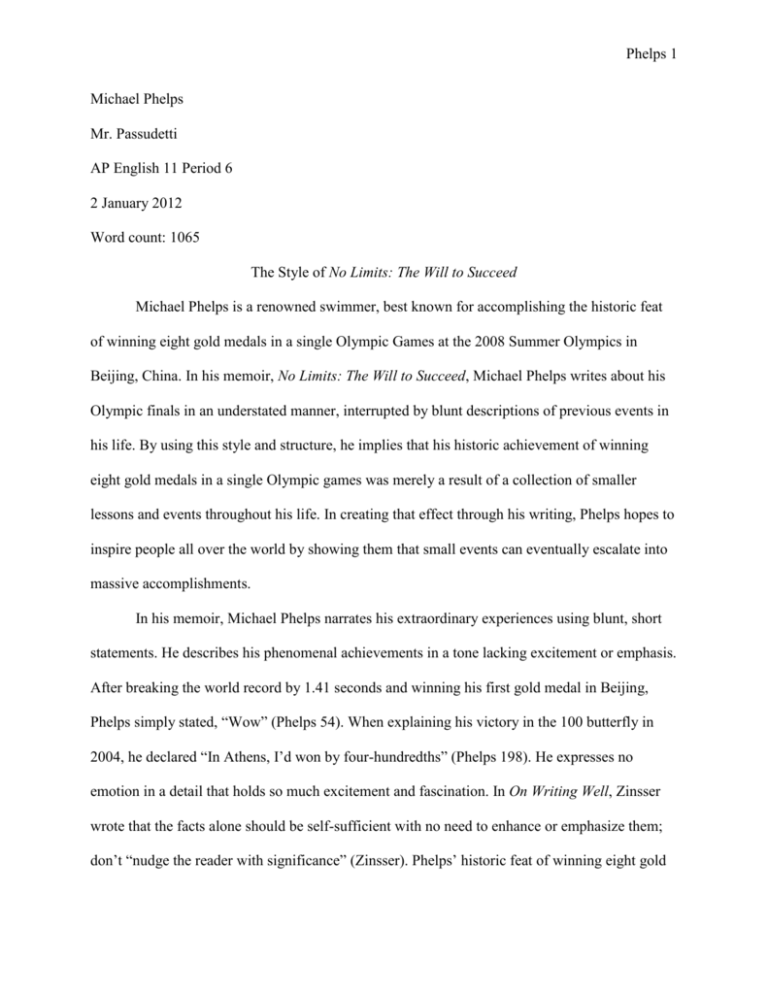
Phelps 1 Michael Phelps Mr. Passudetti AP English 11 Period 6 2 January 2012 Word count: 1065 The Style of No Limits: The Will to Succeed Michael Phelps is a renowned swimmer, best known for accomplishing the historic feat of winning eight gold medals in a single Olympic Games at the 2008 Summer Olympics in Beijing, China. In his memoir, No Limits: The Will to Succeed, Michael Phelps writes about his Olympic finals in an understated manner, interrupted by blunt descriptions of previous events in his life. By using this style and structure, he implies that his historic achievement of winning eight gold medals in a single Olympic games was merely a result of a collection of smaller lessons and events throughout his life. In creating that effect through his writing, Phelps hopes to inspire people all over the world by showing them that small events can eventually escalate into massive accomplishments. In his memoir, Michael Phelps narrates his extraordinary experiences using blunt, short statements. He describes his phenomenal achievements in a tone lacking excitement or emphasis. After breaking the world record by 1.41 seconds and winning his first gold medal in Beijing, Phelps simply stated, “Wow” (Phelps 54). When explaining his victory in the 100 butterfly in 2004, he declared “In Athens, I’d won by four-hundredths” (Phelps 198). He expresses no emotion in a detail that holds so much excitement and fascination. In On Writing Well, Zinsser wrote that the facts alone should be self-sufficient with no need to enhance or emphasize them; don’t “nudge the reader with significance” (Zinsser). Phelps’ historic feat of winning eight gold Phelps 2 medals in a single Olympic Games is already impressive; he has no need to emphasize it and make it sound amazing when the readers already know it is. By using short and blunt statements, he creates an effect that the feats are small and less significant. Michael Phelps also uses simple diction choices when writing his memoir. He describes his incredible achievements in common words that would be used in daily conversations. For example, before listing all the injuries he suffered from 2004 to 2008, Phelps led into it by explaining why he did not think of the four years in between the Athens Olympics and Beijing Olympics as a long time. Instead of introducing his hardships with elaborate adjectives that truly conveyed the pain and frustration he felt, Phelps simply stated, “Because stuff happens” (Phelps 27). He wrote his entire memoir in a way that came naturally, using words and phrases that were readily in his mind (Strunk 101). He avoided fancy words, abiding to the rule that “the ear must be quicker than the handbook” (Strunk 113). By doing so, Phelps established an ethos as a relaxed, humble champion unaffected by the magnitude of his achievements. His simple diction choices made his accomplishments seem less significant; he describes them in everyday words, implying that they are no more important than anything else people normally speak about. Michael Phelps separated his memoir into eight chapters, each describing a different final. Those chapters were then named after a specific character trait attributed to that race and victory. For example, the chapter about the individual medley was named “Perseverance,” the 400 freestyle relay was named “Belief”, and so on. By separating the memoir into chapters, Phelps followed one of Strunk’s elementary principles of composition by choosing “a suitable design and holding to it” (Strunk 31). He set up a distinct structure, based on his skills and needs. In this case, the structure Phelps chose allowed him to clearly address each individual race. This Phelps 3 division of the memoir into chapters caused his major accomplishment of winning eight gold medals to seem as though it was only a series of smaller accomplishments, or single races. Throughout his memoir, Michael Phelps constantly interrupts the narration of his Olympic races by inserting flashbacks of prior events in his life. Those flashbacks do not all relate to swimming; some describe past experiences with his family or at school. However, all those events or lessons described seem minor and insignificant compared to his main achievement of the novel: winning eight Olympic gold medals. By using these flashbacks, Phelps showed the small steps it took for him to accomplish that historic feat. For example, Phelps narrated the time he threw a tantrum at swim practice when he was younger (Phelps 62). Although it seems irrelevant, its consequences taught Phelps the importance of respecting his coach and his rules. When he was arrested for driving under the influence (Phelps 142), he discovered how to learn from his mistakes. Without these minor lessons and events along the way, Phelps would not have been able to achieve that historic feat of eight gold medals. By using blunt statements, simple diction, structured chapters, and flashbacks, Michael Phelps write about his accomplishments in his memoir in an understated manner. Writers use understatements to deliberately make a situation seem less important than it is. In doing so, it causes the reader to realize that the lack of emphasis is odd. Therefore, it allows the magnitude of the situation or accomplishment to be more obvious, increasing its effect on the reader. The little events or achievements in Phelps’s life, described as though minor and insignificant, came together and led to his historic feat of winning eight gold medals. Those eight races in Beijing, separated into eight distinct chapters and characterized by eight distinct traits, built on each other to lead to an amazing accomplishment. Phelps uses understatements to make his achievements seem as though they are merely a result of a collection of smaller things coming together. Phelps 4 In writing his memoir, Phelps is trying to inspire people by showing them that small events can eventually escalate into massive accomplishments. He uses his own achievements to serve as a model. He broke up his historic feat into several smaller events and stories until that amazing achievement seemed tangible to normal human beings and merely a result of a collection of accomplishments. It shows that seemingly insignificant events can build upon each other to produce an incredible achievement. By demonstrating this point using his own experiences, Phelps proves it to the audience, allowing them to apply it to their own lives. He implies that if a person continues to work hard, overcome obstacles, and learn lessons, then eventually they can accomplish something historic and influential as well. Phelps inspires his readers to continue working hard and accomplishing the little things, because they could be just one small achievement away from making history. Works Cited Phelps, Michael, and Alan Abrahamson. No Limits: The Will to Succeed. New York: Free, 2008. Print. Strunk, William, and E. B. White. The Elements of Style. New York: Macmillan, 1979. Print. Zinsser, William Knowlton. On Writing Well: The Classic Guide to Writing Nonfiction. New York: HarperCollins, 2006. Print.

